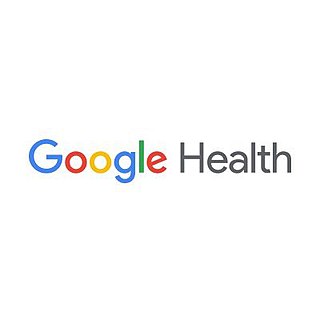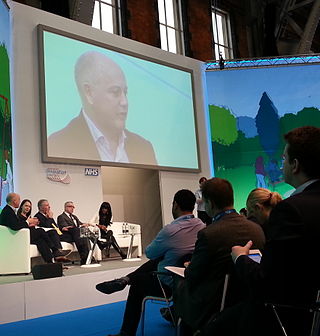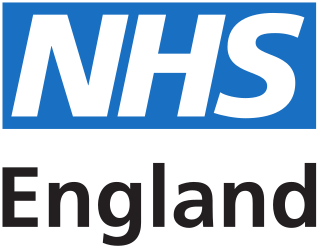Related Research Articles

NHS Digital was the trading name of the Health and Social Care Information Centre, which was the national provider of information, data and IT systems for commissioners, analysts and clinicians in health and social care in England, particularly those involved with the National Health Service of England. The organisation was an executive non-departmental public body of the Department of Health and Social Care.

Google Health was a project by Google designed as an attempt to create a repository of health records and data in order to connect doctors, hospitals and pharmacies directly. The project was introduced in 2008 and discontinued in 2012. Google Health was restarted in 2018, but appeared to be discontinued in 2021 and was officially called an "effort" rather than a separate division as of 2022.

The National Health Service (NHS) is the publicly funded healthcare system in England, and one of the four National Health Service systems in the United Kingdom. It is the second largest single-payer healthcare system in the world after the Brazilian Sistema Único de Saúde. Primarily funded by the government from general taxation, and overseen by the Department of Health and Social Care, the NHS provides healthcare to all legal English residents and residents from other regions of the UK, with most services free at the point of use for most people. The NHS also conducts research through the National Institute for Health and Care Research (NIHR).
Electronic prescription is the computer-based electronic generation, transmission, and filling of a medical prescription, taking the place of paper and faxed prescriptions. E-prescribing allows a physician, physician assistant, pharmacist, or nurse practitioner to use digital prescription software to electronically transmit a new prescription or renewal authorization to a community or mail-order pharmacy. It outlines the ability to send error-free, accurate, and understandable prescriptions electronically from the healthcare provider to the pharmacy. E-prescribing is meant to reduce the risks associated with traditional prescription script writing. It is also one of the major reasons for the push for electronic medical records. By sharing medical prescription information, e-prescribing seeks to connect the patient's team of healthcare providers to facilitate knowledgeable decision making.

Tim Kelsey is an English-Australian business executive. He is CEO of Beamtree,, an Australian healthcare company (ASX:BMT) based in Sydney, Australia. He started in the role in December 2020.

Matthew Steven Gould is a British former civil servant and diplomat who is the Chief Executive Officer of international science-led conservation charity ZSL. He was previously National Director for Digital Transformation in NHS England (2019–2022), Director General for Digital and Media Policy in the Department for Digital, Culture, Media and Sport (2015–19) and Ambassador to Israel (2010–15).
Health Education England (HEE) is an executive non-departmental public body of the Department of Health and Social Care. Its function is to provide national leadership and coordination for the education and training within the health and public health workforce within England. It has been operational since June 2012.
Digital health is a discipline that includes digital care programs, technologies with health, healthcare, living, and society to enhance the efficiency of healthcare delivery and to make medicine more personalized and precise. It uses information and communication technologies to facilitate understanding of health problems and challenges faced by people receiving medical treatment and social prescribing in more personalised and precise ways. The definitions of digital health and its remits overlap in many ways with those of health and medical informatics.

NHS England, officially the NHS Commissioning Board, is an executive non-departmental public body of the Department of Health and Social Care. It oversees the budget, planning, delivery and day-to-day operation of the commissioning side of the National Health Service in England as set out in the Health and Social Care Act 2012. It directly commissions NHS general practitioners, dentists, optometrists and some specialist services. The Secretary of State publishes annually a document known as the NHS mandate which specifies the objectives which the Board should seek to achieve. National Health Service Regulations are published each year to give legal force to the mandate.
Patient record access in the United Kingdom has developed most fully in respect of the GP record, because computerisation in that field is almost universal. British hospitals were slower to move into electronic records. From 1 April 2015 all GP practices in England have to provide online services to patients, including access to summary electronic medical records.
Babylon Health was a digital-first health service provider that combined an artificial intelligence-powered platform with virtual clinical operations for patients. Patients are connected with health care professionals through their web and mobile application.
The NHS App allows patients using the National Health Service in England to book appointments with their GP, order repeat prescriptions and access their GP record. Available since late 2018, the app was developed by NHS Digital and NHS England. The health ministers Jeremy Hunt and Matt Hancock both stressed their support for the project. Hancock presented it as the key a radical overhaul of NHS technology. Hunt claimed it would mark 'the death-knell of the 8am scramble for GP appointments that infuriates so many patients'.
In 2005 the National Health Service (NHS) in the United Kingdom began deployment of electronic health record systems in NHS Trusts. The goal was to have all patients with a centralized electronic health record by 2010. Lorenzo patient record systems were adopted in a number of NHS trusts. While many hospitals acquired electronic patient records systems in this process, there was no national healthcare information exchange. Ultimately, the program was dismantled after a cost to the UK taxpayer was over $24 billion, and is considered one of the most expensive healthcare IT failures.

COVID-19 apps include mobile-software applications for digital contact-tracing - i.e. the process of identifying persons ("contacts") who may have been in contact with an infected individual - deployed during the COVID-19 pandemic.

The (Google/Apple) Exposure Notification (GAEN) system, originally known as the Privacy-Preserving Contact Tracing Project, is a framework and protocol specification developed by Apple Inc. and Google to facilitate digital contact tracing during the COVID-19 pandemic. When used by health authorities, it augments more traditional contact tracing techniques by automatically logging close approaches among notification system users using Android or iOS smartphones. Exposure Notification is a decentralized reporting protocol built on a combination of Bluetooth Low Energy technology and privacy-preserving cryptography. It is an opt-in feature within COVID-19 apps developed and published by authorized health authorities. Unveiled on April 10, 2020, it was made available on iOS on May 20, 2020 as part of the iOS 13.5 update and on December 14, 2020 as part of the iOS 12.5 update for older iPhones. On Android, it was added to devices via a Google Play Services update, supporting all versions since Android Marshmallow.

Digital contact tracing is a method of contact tracing relying on tracking systems, most often based on mobile devices, to determine contact between an infected patient and a user. It came to public prominence in the form of COVID-19 apps during the COVID-19 pandemic. Since the initial outbreak, many groups have developed nonstandard protocols designed to allow for wide-scale digital contact tracing, most notably BlueTrace and Exposure Notification.

Indra Joshi is a British physician who is Director of Artificial Intelligence for NHSX and a founding ambassador of One HealthTech. She supports NHSx with digital health initiatives in the National Health Service in England. During the COVID-19 pandemic Joshi was appointed to the Scientific Advisory Group for Emergencies (SAGE).

NHS COVID-19 was a voluntary contact tracing app for monitoring the spread of the COVID-19 pandemic in England and Wales. It had been available since 24 September 2020 for Android and iOS smartphones, and can be used by anyone aged 16 or over.

NHS Test and Trace is a government-funded service in England, established in 2020 to track and help prevent the spread of COVID-19. The programme is part of the UK Health Security Agency; the service and the agency are headed by Jenny Harries.

The United Kingdom's response to the COVID-19 pandemic consists of various measures by the healthcare community, the British and devolved governments, the military and the research sector.
References
- 1 2 "NHSX: new joint organisation for digital, data and technology". GOV.UK. 19 February 2019.
- 1 2 "Specialist unit will lead NHS digital revolution". Building better Healthcare. 9 April 2019. Retrieved 20 May 2019.
- ↑ Crouch, Hannah (19 February 2019). "Digital Health News confirms new NHSX unit to oversee digital transformation". Digital Health. Retrieved 19 May 2020.
- ↑ "NHSX to be merged into new NHS England transformation directorate". Health Service Journal. 15 February 2021. Retrieved 11 April 2021.
- ↑ Lovell, Tammy (22 November 2021). "NHSX and NHS Digital to be axed". Healthcare IT News. Retrieved 7 September 2023.
- ↑ "NHSX moves on". NHS Transformation Directorate. 4 February 2022. Retrieved 7 September 2023.
- ↑ "NHS hospitals and GP practices to get fibre optic internet". Building Better Healthcare. 8 May 2019. Retrieved 7 July 2019.
- ↑ Blackwood, N., Embracing AI and technology to improve patient outcomes, CogX Festival, GOV.UK, published 12 June 2019, accessed 24 June 2019
- ↑ "Tech chiefs pledge £40m to end staff's 'ridiculous' login problems". Health Service Journal. 4 January 2020. Retrieved 24 February 2020.
- ↑ "NHSX to oversee industry access to patient data". Health Service Journal. 16 July 2019. Retrieved 25 August 2019.
- ↑ "New programme to support UK-wide adoption of digital social care records". Homecare Insight. 21 January 2021. Retrieved 21 March 2021.
- ↑ "Paperless 2024 target a 'stretch' – NHSX CEO". Health Service Journal. 1 July 2019. Retrieved 23 August 2019.
- ↑ "The digital challenge: achieving a paperless NHS by 2020". Health Europa. 15 October 2018. Retrieved 23 August 2019.
- ↑ "NHSX: All NHS must have shared care records in a year". Health Service Journal. 21 September 2020. Retrieved 5 November 2020.
- ↑ "NHSX working on coronavirus contact tracking app". Digital Health. 20 March 2020. Retrieved 4 March 2020.
- ↑ Manthorpe, Roland (31 March 2020). "Coronavirus: Govt set to release 'contact tracking' app which detects nearby virus carriers". Sky News. Retrieved 8 May 2020.
- ↑ Kelion, Leo (4 May 2020). "App stores approve UK contact-tracing app for test". BBC News. Retrieved 5 May 2020.
- ↑ Neville, Sarah; Bradshaw, Tim; Warrell, Helen (8 May 2020). "UK starts to build second contact tracing app" . Financial Times. Retrieved 8 May 2020.
- ↑ "Coronavirus: England and Wales' contact-tracing app gets launch date". BBC News . 11 September 2020. Retrieved 11 September 2020.
- ↑ "NHSX announces projects are to receive share of £6.5m as part of Adoption Fund". Digital Health. 27 October 2021. Retrieved 15 November 2021.